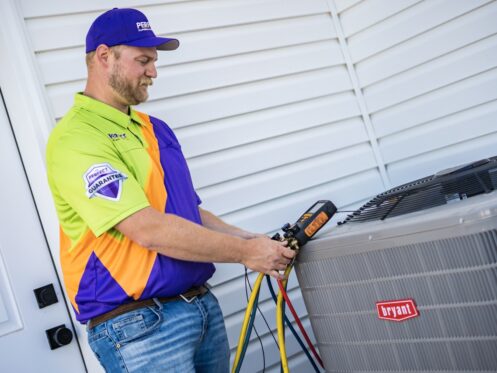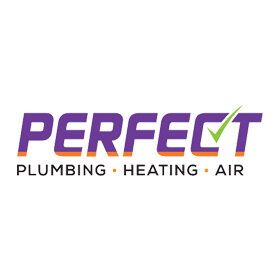Summer heat can push your air conditioner to its limits, but did you know that it can also push your system beyond its limits? An AC system that’s working too hard isn’t just a comfort issue—it’s a sign of bigger problems that can lead to costly repairs and sky-high energy bills.
Understanding these warning signs that your AC is working harder than it should can help you catch problems early and keep your home comfortable without breaking the bank. Here are five key indicators that your air conditioner is working harder than it should.
1. Your AC Never Stops Running
In moderate conditions, a properly functioning air conditioner will cycle on and off throughout the day. It cools your home to the set temperature, then takes a break until the temperature rises again. If you notice your AC running constantly without ever shutting off, something’s wrong.
Constant running means your system is struggling to reach or maintain your desired temperature. This could happen for several reasons. Your AC might be too small for your home’s size, or there could be air leaks letting hot air in and cool air out. Dirty air filters are another common culprit—they restrict airflow and force your system to work overtime.
A constantly running AC isn’t just inefficient; it’s also wearing out the components faster than normal. The compressor, fan motor, and overall system weren’t designed to run 24/7, and this continuous operation can lead to premature failure.
2. Your Energy Bills Keep Climbing
Have you noticed your electricity bills getting higher each month, even when your usage habits haven’t changed? An overworked air conditioner could be the culprit behind these unexpected spikes.
Several issues can cause this increased energy consumption. Dirty coils and air filters make it harder for your system to work properly, low refrigerant levels reduce cooling efficiency, and aging components simply don’t work as well as they used to.
When your AC has to work harder to cool your home, it uses more energy. This might happen gradually at first, making it easy to miss. You might think it’s just normal summer usage, but if your bills are significantly higher than the same period last year without an explanation like rate or usage changes, your AC could be struggling.
3. Some Rooms Are Too Hot While Others Are Too Cold
If your home feels like it has different climate zones—with some rooms freezing while others are uncomfortably warm—your AC is working too hard to compensate for underlying problems.
This kind of uneven cooling often points to problems in your ductwork, such as leaks, blockages, or poor design. As a result, your system runs longer, trying to push enough cool air into the warmer rooms while overcooling the rest of the house.
A failing thermostat can also cause your home to cool unevenly. If it’s misreading the room temperature, or if it’s poorly located, your thermostat may be triggering your AC even when it’s not really needed.
4. Strange Noises Are Coming From Your System
Your air conditioner should run relatively quietly. Sure, you’ll hear some normal operational sounds, but if you’re noticing new noises like grinding, squealing, rattling, or banging, your system is telling you it’s in distress.
These sounds often indicate that components are wearing out from overuse. A grinding noise might mean your motor bearings are failing, while squealing could indicate a worn belt or bearing. Rattling might suggest loose parts that are vibrating from extended operation.
Don’t ignore these warning signs. Strange noises usually get worse over time, and what starts as a minor issue can quickly become a major repair if left untreated.
5. Your Home Feels Humid Despite the AC Running
A properly working air conditioner doesn’t just cool your home—it also removes excess moisture. If your home still feels sticky or muggy with the AC running, your system likely isn’t dehumidifying effectively.
Common causes include improper sizing—oversized units cool too quickly without removing humidity, while undersized systems can’t keep up. Other issues include low refrigerant, poor airflow from dirty filters or blocked vents, and clogged condensate drains. Even having your thermostat fan set to “on” instead of “auto” can blow moisture back into the air before it drains away.
High humidity isn’t just uncomfortable—it can promote mold and make your home feel hotter, leading you to lower the thermostat and drive up energy use.
Many of these problems require professional HVAC help. While a tune-up won’t fix system sizing issues, your technician can spot symptoms and offer guidance. They may also catch simple setting problems, like a fan set to the wrong mode, during their visit.
Quick DIY Fixes You Can Try
Before calling for professional help, there are a few simple things you can check:
Replace your air filter if it’s dirty or clogged. This is the most common cause of AC problems and the easiest to fix.
Check your thermostat settings to make sure it’s set to “auto” rather than “on” and that the temperature setting is reasonable.
Clear debris in a 2-foot radius from around your outdoor unit. Grass, leaves, and other obstructions can block airflow and make your system work harder.
Inspect your vents to ensure they’re not blocked by furniture, curtains, or other objects.
Look for obvious air leaks around windows, doors, and ductwork that might be letting hot air in.
When to Call a Professional
While some issues are easy DIY fixes, others require professional expertise. Call a qualified HVAC technician if:
- Your AC is more than 10 years old and showing multiple warning signs
- You suspect refrigerant leaks or electrical problems
- Strange noises persist after basic maintenance
- Your system frequently trips circuit breakers
- You notice ice forming on your indoor or outdoor unit
- DIY fixes haven’t improved performance
A professional can diagnose complex issues like refrigerant leaks, compressor problems, or electrical faults that aren’t safe for homeowners to handle.
Don’t Let Your AC Suffer in Silence
Your air conditioner works hard to keep you comfortable, but it shouldn’t have to work overtime to do its job. Recognizing these warning signs early can save you money on energy bills and prevent costly repairs down the road.
Regular maintenance is your best defense against an overworked AC. An annual tune-up, timely filter changes, and prompt attention to minor issues can keep your system running efficiently for years to come.
If you’ve noticed any of these signs in your home, don’t wait for a complete system breakdown. At Perfect Plumbing, Heating, Air, we’re here to help diagnose and resolve AC issues before they become major problems. Our experienced technicians can get your system back to running smoothly and efficiently. Contact us today to schedule your service consultation and enjoy the comfort you deserve!


